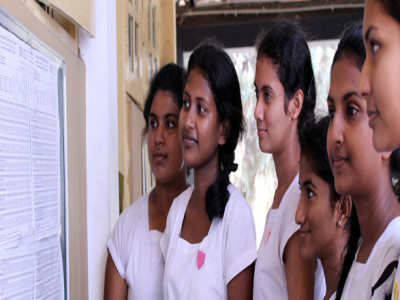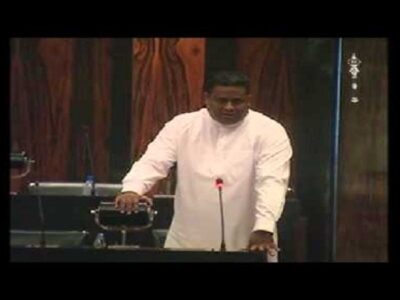(COLOMBO, LANKAPUVATH) – Sri Lanka’s Prime Minister Ranil Wickramasinghe who is visiting the Republic of the Maldives on an official visit addressed the People’s Majlis, the Parliament of the Maldives today.
Addressing the Maldivian lawmakers, the Premier said although Sri Lanka and the Maldives established diplomatic relations in 1965, the relationship between the people of the two countries dates back many centuries.
Today, he said, Sri Lanka and Maldives are two neutral nations situated at the cross roads of the Indian Ocean – faced with rising regional tensions, terrorism, piracy and drug trafficking. “Therefore, we must strengthen our bilateral dialogue in this sphere and seek ways to cooperate in containing and overcoming these threats,” the Premier emphasized.
Following is Prime Minister’s speech in full:
SPEECH MADE BY HON. RANIL WICKREMESINGHE – PRIME MINISTER OF SRI LANKA, AT THE PEOPLES MAJLIS OF THE REPUBLIC OF MALDIVES ON 3 SEPTEMBER 2019
Honourable Speaker of the People’s Majlis –
My Good Friend Mohamad Nasheed
Honourable Members of the People’s Majlis
Distinguished Guests
It is indeed a great honour to address the People’s Majlis of the Maldives Islands at a time when the people of the Maldives enjoy the privileges of Parliamentary Democracy and when the Parliament is headed by the former President of the Maldives, a Democracy Campaigner, and long-time friend of Sri Lanka. I must first thank the Honorable Speaker and the Members of the Majlis for inviting me to address the People’s Majlis.
Even though diplomatic relations between our two countries started on the 26th July 1965, the very first day the Maldives gained independence, the relationship between the people of Sri Lanka and the Maldives dates back many centuries. According to the Mahavamsa, the great Sri Lankan chronicle, the Maldives was known as Mahiladvipika and is supposed to where part of the group that came with Prince Vijaya settled down.
The people of our nations also share common attributes of culture, food and linguistics. Our languages Dhivehi and Sinhalese have a common origin in Elu Prakrit. Sri Lanka is considered to be the second home for many Maldivians – providing shared experiences in educational and medical services. Many Sri Lankans work in the Maldives while all of us relish the famous Maldivian Fish product known to us as Umbalakada.
But, Honorable Speaker, Our commonalities are not limited to culture, food and trade. Both our people have a strong commitment to democracy. At the outset, I would like to congratulate President Solih and Speaker Nasheed who are the front-runners of the democratic movement in the Maldives for having strengthened people’s power and rights in the Maldives. And, I would like to make use of this opportunity to explain to you the major strides taken to strengthen democracy and ensure freedom of society in Sri Lanka – during the last few years of our government.
In both our countries, executive power is vested in the President. But in Sri Lanka, it is the Cabinet of Ministers, which includes the President that is in charge of the direction and control of the Government. The Cabinet of Ministers is also collectively responsible to the Parliament. The President is tasked with appointing as the Prime Minister, the person who is likely to command the most support in Parliament. Furthermore, this position was upheld by the Court of Appeal in 2018 when it issued an interim order restraining Mahinda Rajapaksa, the former President, from functioning as Prime Minister, despite being appointed by the President, since 122 of the 225 Members of Parliament were opposed to him.
Earlier, the President also has the discretionary powers to appoint Ministers from among the Members of Parliament – contrary to the Westminster tradition of Parliament. The 19th Amendment to our Constitution, corrected this position by requiring the President to appoint Ministers on the advice of the Prime Minister. This reinforced the collective responsibility of the Cabinet of Ministers to Parliament.
Today, the major features of the Westminster Parliamentary Government exist side by side with an Executive Presidency – which we are committed to abolish due to its profound powers that have often been exploited and abused by its incumbents – with impunity.
The 19th Amendment further strengthened Parliament by restricting the President’s powers to dissolve Parliament. The President cannot dissolve Parliament for four and a half years unless Parliament requests a dissolution by a two-thirds majority. In October 2018, the President purported to dissolve Parliament without such a resolution but the Supreme Court held that this dissolution to be unconstitutional.
Another important provision enacted under the 19th Amendment reduced the term of the President and Parliament to five years from the earlier term of six years.
Prior to the 19th amendment the President had near-total immunity from suit. This was restricted by the Nineteenth Amendment which provided for official acts of the President to be reviewable by the Supreme Court under its fundamental rights jurisdiction. The dissolution of Parliament in 2018 was declared unconstitutional under this provision.
The 19th amendment was deemed necessary, as I said, because of the flagrant violations of the constitution under the previous regime. For instance, the then Chief Justice Shirani Bandaranayake was removed in 2013 without a proper resolution of impeachment. Similarly, there was a high level of politicization of the Public Service and the Police. The 19th Amendment addressed these issues by establishing,
(i) An Independent Judicial Service Commission
(ii) An Independent Police Commission
(iii) An Independent Public Service Commission
(iv) An Election Commission
(v) A Finance Commission and
(vi) A National Audit Commission
The members of these Commissions are now appointed by the Constitutional Council, which also approves the appointments of the Chief Justice, the Judges of the Superior Courts, the Inspector General of the Police, and the Attorney General. Today, the Constitutional Council can refer back to the President, names recommended by him together with alternative recommendations. The Constitutional Council includes the Speaker, Prime Minister, Leader of the Opposition, a representative of the President and three Civil Society members.
Furthermore, Honorable Speaker,
The legislative exercises of Parliament was enriched and expanded by introducing the Sectoral Oversight Committee system. Accordingly, 16 Sectoral Oversight Committees comprising Members of Parliament were established to assist Parliament in the analysis, appraisal and evaluation of the application, administration, execution and effectiveness of legislation passed by Parliament.
All Bills, Resolutions, Treaties and Reports are referred to the relevant Oversight Committee for report prior to being considered by the Parliament.
Moreover, Honorable Speaker,
Very soon we will be tabling a Bill to establish a Parliamentary Budget Office.
One of the core tenets of democracy is people’s right to information. It has been included as a fundamental right in the 19th Amendment. The Right to Information Act passed by our Parliament is recognized as one of the strongest such laws in the world.
But, laws alone do not strengthen democracy. Laws can be repealed or ignored. The strengthening of key democratic institutions, and their implementing mechanisms is also necessary. We achieved the independence of these institutions through the above mentioned Constitutional Council. The appointees were no longer dependent on the whims of the executive. They have the space to act independently.
But the challenge is not over. The abuse of the democratic space for example, through hate speech and fake news are some of the new dangers. The social media is like a god of ancient times: Both the creator and the destroyer: It has the ability to spread the message of freedom as well as to rouse passions and emotions that lead to its destruction. It is the dilemma of the cyber space and democracy – the frightening ability to create a thousand Hitler’s setting fire to a thousand Reichstags.
Finding a balance between the democratization of news and the legal obligations of the user to prevent harm is the complex question that which we, you and many countries, have to grapple with. The final solution will require an educated public – aware of their freedoms and the threats that are posed by the net and the web.
Honorable Speaker,
Sri Lanka has been subjected to over twenty-five years of terrorism. Nevertheless, the Easter Sunday bombings by sympathizers of the ISIS was a radically different terrorist attack. We have learnt a lot from this tragic experience; and today, Sri Lanka stands ready to work with all stakeholders to establish an effective mechanism for regional cooperation to counter ISIS terrorism.
I must also express my indebtedness, at this juncture, to your delegation who visited Sri Lanka after the bomb explosion. Honorable Speaker, they gave us much needed support at that critical juncture.
Historically, Sri Lanka and the Maldives have maintained convivial and supportive bilateral relationships. In recent times, Sri Lanka has been assisting the Maldives in the areas of education, and the capacity building of the Maldivian military and police. Of course, the Maldives – Sri Lanka Joint Commission which was established in 1984 has also been working on mutual cooperation in the areas of tourism, fisheries, education, health, skills development, sports, employment and cultural cooperation.
Today, the diversification in trade is a strong component of the bilateral relations between Sri Lanka and Maldives. The Maldives is the third largest export destination for Sri Lanka among the SAARC countries, after India and Pakistan. The value of total trade between the two countries, which stood at US$ 271.1 million in 2017, has increased to the level of US$ 304.3 million in 2018.
Hundreds of Sri Lankan professionals and skilled workers are cordially received in the Maldives. Of late, there has been an increase in the number of employment opportunities for Sri Lankans in the Maldives. I have no doubt that Sri Lankan can supply more professional and skilled workers, particularly in the fields of construction, hospitality and education.
In order to fortify the mutual relationship between our countries further, several agreements of cooperation – in the areas of visa facilitation, water supply, youth development, vocational training, higher education and social empowerment were signed between our two countries during my visit.
In addition, parents or guardians of students studying in Sri Lanka will now be able get guardian visas till the student reaches the age of 18 years with no lower age limit. As a special arrangement, visas for grandparents of the students will also be facilitated so that they could stay and spend time with their grandchildren in Sri Lanka.
Maldivians can now undergo organ transplant in Sri Lanka – including Kidney and Liver transplants – in all private hospitals in Sri Lanka. Sri Lanka will also assist the Maldives to set up a drug rehabilitation center in Addu Atoll, and provide all necessary assistance in setting up this facility.
As mentioned to President Ibrahim Mohamed Solih during his state visit to Sri Lanka, we will also assist in setting up two schools in the Maldives. The relevant authorities of both the countries will coordinate this initiative in moving forward. We also signed an agreement on Higher Education and Vocational Training yesterday. When I was the Minister of Education, I initiated a scheme to permit Sri Lankan teachers to teach in your schools. Today, as the Prime Minister, I seek to go further – to bolster your vocational education sector by extending our assistance to train your trainers in numerous occupational skills. We are also looking at offering higher education opportunities in Sri Lanka for Maldivian students.
Honorable Speaker,
Sri Lanka and Maldives are two neutral nations situated at the cross roads of the Indian Ocean – faced with rising regional tensions, terrorism, piracy and drug trafficking. Therefore, we must strengthen our bilateral dialogue in this sphere and seek ways to cooperate in containing and overcoming these threats.
Today, climate change is an impeding threat to all of us. We are cognizant of the particular vulnerability of the Maldives to rising sea levels and the very real danger of your islands coming under water. Let me reassure you that we stand ready to support you fully in your fight against rising sea levels and global warming.
Honorable Speaker,
I would like to thank you once again for giving this opportunity to address this respected house, the Majlis, and I would like to thank the President of the Maldives, His Excellency, Ibrahim Solih for inviting me and my wife to visit your beautiful country.
I would also like to again thank the Group of Parliamentarians led by the Honorable Speaker Nasheed who visited Sri Lanka just after the Easter Sunday bombings as a confidence-building measure.
On behalf of the Government and People of Sri Lanka, the closest friends of the people of the Maldives, I wish you all success in your journey towards peace, prosperity, freedom and democracy. I would also like to reiterate our commitment and cooperation towards achieving our common goals.
Thank you.




